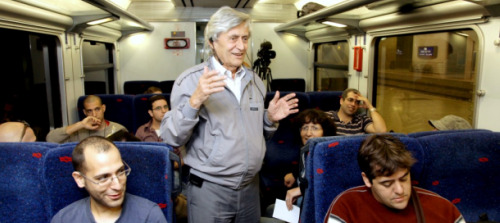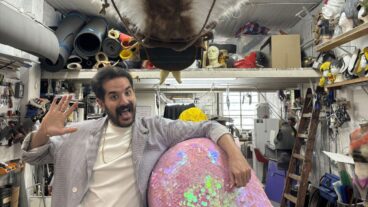A rail-blazing idea from one Israeli university has professors lecturing Israeli commuters as they ride the intercity trains.

The morning commute is bound for education. A new Hebrew University project called “Scientists on the Trains,” promotes education on the rails as the institution sends out its professors to teach the Israeli public in transit.
The idea kicked off this month, with the university’s ultimate teacher, past President Emeritus Hanoch Gutfreund, who rode the morning train from Modi’in to Tel Aviv lecturing the public about the love letters written by Einstein and his wives.
The idea of professors teaching academic seminars onboard trains was dreamed up by the Hebrew University’s creative spokesperson Orit Suliteanu.
The status of higher education has been declining in Israel, she tells ISRAEL21c, and the public isn’t informed about the nature of research and what a research university like Jerusalem’s Hebrew University is all about. “We thought maybe we should go to places that aren’t typical – to go out and show what we create here,” she says.
In cooperation with Israel Railways, Hebrew University is planning on running a series of seminars on the train in the coming year, as commuters head from the satellite town of Modi’in to Tel Aviv in the morning and then back again in the evening. The professor will be in a designated car and will lecture to about 60 people on each trip.
Learning with love letters
The schedule and content for this pilot project is still flexible, but future lecturers will most likely explore topics like global warming, the creation of Earth and how the brain works.
Gutfreund’s lecture about the love letters between Einstein and his first and then second wife was a natural choice since Einstein was one of the founders of the Hebrew University in the 1920s. He gave its first lecture in 1923, and upon his death, donated his collection of material to the university where it is now located in a special museum.
“The love letters between Albert Einstein and his first wife Mileva and the love letters to his second wife Elsa teach us about the emotional and intellectual development of the greatest scientist of the 20th century,” Gutfreund expounds.
“In later years, he wrote to Elsa almost every day when he was traveling away from home. Those were no longer love letters, but they are interesting because they convey his impressions of the places he visited, from people he met to events that occurred around him.”
Gutfreund, who still teaches at the university, says that lecturing to the public on the train is an important endeavor, and that he is interested in how he will cope with the new forum – typically half the passengers on the train sit facing the back, while the other half faces front. During his first lecture he spent considerable time walking up and down the car.
A model train for other cities
With what seem like annual strikes by Israeli universities in recent years, the public is showing less interest in the country’s government-funded institutions, and is choosing private colleges rather than contend with the disruptions.
Says Gutfreund: “We are trying to convey to the public that what researchers are doing is an interesting part of the cultural life and existence of society.”
As far as he and the spokesperson know, no one else in the world has provided lectures on trains. Since the first lecture was advertised, the university has seen over-whelming interest in the idea from the local media.
About 15 professors have signed on to the project, which has implications beyond education. It could be used as a model to encourage sustainable transportation, encouraging more people all over the world to use public transport and leave the polluting car at home.
It certainly has to be more stimulating to learn about Einstein’s love life than to sit in gridlock traffic.












